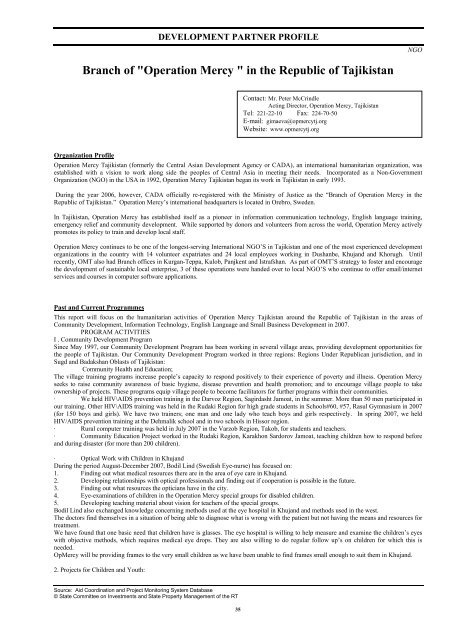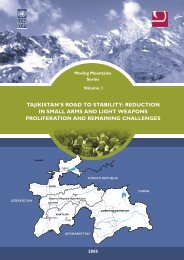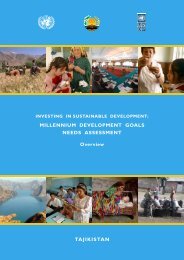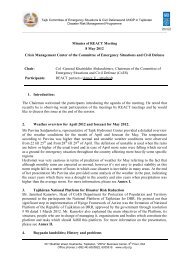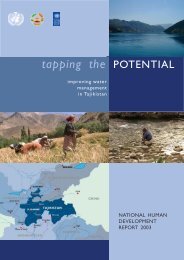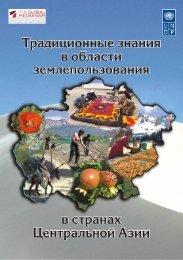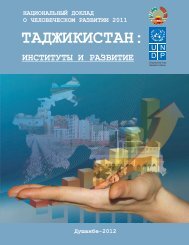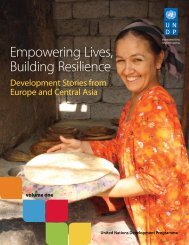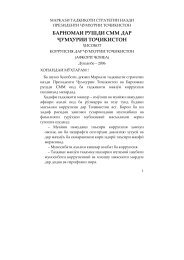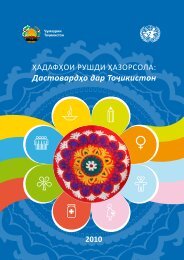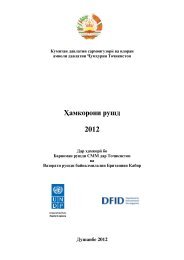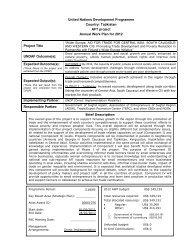Eng - UNDP in Tajikistan
Eng - UNDP in Tajikistan
Eng - UNDP in Tajikistan
Create successful ePaper yourself
Turn your PDF publications into a flip-book with our unique Google optimized e-Paper software.
DEVELOPMENT PARTNER PROFILE<br />
NGO<br />
Branch of "Operation Mercy " <strong>in</strong> the Republic of <strong>Tajikistan</strong><br />
Contact: Mr. Peter McCr<strong>in</strong>dle<br />
Act<strong>in</strong>g Director, Operation Mercy, <strong>Tajikistan</strong><br />
Tel: 221-22-10 Fax: 224-70-50<br />
E-mail: gimaeva@opmercytj.org<br />
Website: www.opmercytj.org<br />
Organization Profile<br />
Operation Mercy <strong>Tajikistan</strong> (formerly the Central Asian Development Agency or CADA), an <strong>in</strong>ternational humanitarian organization, was<br />
established with a vision to work along side the peoples of Central Asia <strong>in</strong> meet<strong>in</strong>g their needs. Incorporated as a Non-Government<br />
Organization (NGO) <strong>in</strong> the USA <strong>in</strong> 1992, Operation Mercy <strong>Tajikistan</strong> began its work <strong>in</strong> <strong>Tajikistan</strong> <strong>in</strong> early 1993.<br />
Dur<strong>in</strong>g the year 2006, however, CADA officially re-registered with the M<strong>in</strong>istry of Justice as the “Branch of Operation Mercy <strong>in</strong> the<br />
Republic of <strong>Tajikistan</strong>.” Operation Mercy’s <strong>in</strong>ternational headquarters is located <strong>in</strong> Orebro, Sweden.<br />
In <strong>Tajikistan</strong>, Operation Mercy has established itself as a pioneer <strong>in</strong> <strong>in</strong>formation communication technology, <strong>Eng</strong>lish language tra<strong>in</strong><strong>in</strong>g,<br />
emergency relief and community development. While supported by donors and volunteers from across the world, Operation Mercy actively<br />
promotes its policy to tra<strong>in</strong> and develop local staff.<br />
Operation Mercy cont<strong>in</strong>ues to be one of the longest-serv<strong>in</strong>g International NGO’S <strong>in</strong> <strong>Tajikistan</strong> and one of the most experienced development<br />
organizations <strong>in</strong> the country with 14 volunteer expatriates and 24 local employees work<strong>in</strong>g <strong>in</strong> Dushanbe, Khujand and Khorugh. Until<br />
recently, OMT also had Branch offices <strong>in</strong> Kurgan-Teppa, Kulob, Panjkent and Istrafshan. As part of OMT’S strategy to foster and encourage<br />
the development of susta<strong>in</strong>able local enterprise, 3 of these operations were handed over to local NGO’S who cont<strong>in</strong>ue to offer email/<strong>in</strong>ternet<br />
services and courses <strong>in</strong> computer software applications.<br />
Past and Current Programmes<br />
This report will focus on the humanitarian activities of Operation Mercy <strong>Tajikistan</strong> around the Republic of <strong>Tajikistan</strong> <strong>in</strong> the areas of<br />
Community Development, Information Technology, <strong>Eng</strong>lish Language and Small Bus<strong>in</strong>ess Development <strong>in</strong> 2007.<br />
PROGRAM ACTIVITIES<br />
I . Community Development Program<br />
S<strong>in</strong>ce May 1997, our Community Development Program has been work<strong>in</strong>g <strong>in</strong> several village areas, provid<strong>in</strong>g development opportunities for<br />
the people of <strong>Tajikistan</strong>. Our Community Development Program worked <strong>in</strong> three regions: Regions Under Republican jurisdiction, and <strong>in</strong><br />
Sugd and Badakshan Oblasts of <strong>Tajikistan</strong>:<br />
Community Health and Education;<br />
The village tra<strong>in</strong><strong>in</strong>g programs <strong>in</strong>crease people’s capacity to respond positively to their experience of poverty and illness. Operation Mercy<br />
seeks to raise community awareness of basic hygiene, disease prevention and health promotion; and to encourage village people to take<br />
ownership of projects. These programs equip village people to become facilitators for further programs with<strong>in</strong> their communities.<br />
· We held HIV\AIDS prevention tra<strong>in</strong><strong>in</strong>g <strong>in</strong> the Darvoz Region, Sagirdasht Jamoat, <strong>in</strong> the summer. More than 50 men participated <strong>in</strong><br />
our tra<strong>in</strong><strong>in</strong>g. Other HIV\AIDS tra<strong>in</strong><strong>in</strong>g was held <strong>in</strong> the Rudaki Region for high grade students <strong>in</strong> Schools#60, #57, Rasul Gymnasium <strong>in</strong> 2007<br />
(for 150 boys and girls). We have two tra<strong>in</strong>ers; one man and one lady who teach boys and girls respectively. In spr<strong>in</strong>g 2007, we held<br />
HIV/AIDS prevention tra<strong>in</strong><strong>in</strong>g at the Dehmalik school and <strong>in</strong> two schools <strong>in</strong> Hissor region.<br />
· Rural computer tra<strong>in</strong><strong>in</strong>g was held <strong>in</strong> July 2007 <strong>in</strong> the Varzob Region, Takob, for students and teachers.<br />
· Community Education Project worked <strong>in</strong> the Rudaki Region, Karakhon Sardorov Jamoat, teach<strong>in</strong>g children how to respond before<br />
and dur<strong>in</strong>g disaster (for more than 200 children).<br />
· Optical Work with Children <strong>in</strong> Khujand<br />
Dur<strong>in</strong>g the period August-December 2007, Bodil L<strong>in</strong>d (Swedish Eye-nurse) has focused on:<br />
1. F<strong>in</strong>d<strong>in</strong>g out what medical resources there are <strong>in</strong> the area of eye care <strong>in</strong> Khujand.<br />
2. Develop<strong>in</strong>g relationships with optical professionals and f<strong>in</strong>d<strong>in</strong>g out if cooperation is possible <strong>in</strong> the future.<br />
3. F<strong>in</strong>d<strong>in</strong>g out what resources the opticians have <strong>in</strong> the city.<br />
4. Eye-exam<strong>in</strong>ations of children <strong>in</strong> the Operation Mercy special groups for disabled children.<br />
5. Develop<strong>in</strong>g teach<strong>in</strong>g material about vision for teachers of the special groups.<br />
Bodil L<strong>in</strong>d also exchanged knowledge concern<strong>in</strong>g methods used at the eye hospital <strong>in</strong> Khujand and methods used <strong>in</strong> the west.<br />
The doctors f<strong>in</strong>d themselves <strong>in</strong> a situation of be<strong>in</strong>g able to diagnose what is wrong with the patient but not hav<strong>in</strong>g the means and resources for<br />
treatment.<br />
We have found that one basic need that children have is glasses. The eye hospital is will<strong>in</strong>g to help measure and exam<strong>in</strong>e the children’s eyes<br />
with objective methods, which requires medical eye drops. They are also will<strong>in</strong>g to do regular follow up’s on children for which this is<br />
needed.<br />
OpMercy will be provid<strong>in</strong>g frames to the very small children as we have been unable to f<strong>in</strong>d frames small enough to suit them <strong>in</strong> Khujand.<br />
2. Projects for Children and Youth:<br />
Source: Aid Coord<strong>in</strong>ation and Project Monitor<strong>in</strong>g System Database<br />
© State Committee on Investments and State Property Management of the RT<br />
35


